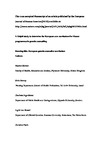A Delphi study to determine the European core curriculum for Master programmes in genetic counselling
| dc.contributor.author | Skirton, H | |
| dc.contributor.author | Barnoy, S | |
| dc.contributor.author | Ingvoldstad, C | |
| dc.contributor.author | van Kessel, I | |
| dc.contributor.author | Patch, C | |
| dc.contributor.author | O'Connor, A | |
| dc.contributor.author | Serra-Juhe, C | |
| dc.contributor.author | Stayner, B | |
| dc.contributor.author | Voelckel, M-A | |
| dc.date.accessioned | 2016-06-02T14:01:05Z | |
| dc.date.available | 2016-06-02T14:01:05Z | |
| dc.date.issued | 2013-10 | |
| dc.identifier.issn | 1018-4813 | |
| dc.identifier.issn | 1476-5438 | |
| dc.identifier.uri | http://hdl.handle.net/10026.1/4805 | |
| dc.description.abstract |
Genetic counsellors have been working in some European countries for at least 30 years. Although there are great disparities between the numbers, education, practice and acceptance of these professionals across Europe, it is evident that genetic counsellors and genetic nurses in Europe are working autonomously within teams to deliver patient care. The aim of this study was to use the Delphi research method to develop a core curriculum to guide the educational preparation of these professionals in Europe. The Delphi method enables the researcher to utilise the views and opinions of a group of recognised experts in the field of study; this study consisted of four phases. Phases 1 and 4 consisted of expert workshops, whereas data were collected in phases 2 and 3 (n=35) via online surveys. All participants in the study were considered experts in the field of genetic counselling. The topics considered essential for genetic counsellor training have been organised under the following headings: (1) counselling; (2) psychological issues; (3) medical genetics; (4) human genetics; (5) ethics, law and sociology; (6) professional practice; and (7) education and research. Each topic includes the knowledge, skills and attitudes required to enable genetic counsellors to develop competence. In addition, it was considered by the experts that clinical practice should comprise 50% of the educational programme. The core Master programme curriculum will enable current courses to be assessed and inform the design of future educational programmes for European genetic counsellors. | |
| dc.format.extent | 1060-1066 | |
| dc.format.medium | Print-Electronic | |
| dc.language | en | |
| dc.language.iso | eng | |
| dc.publisher | Springer Science and Business Media LLC | |
| dc.subject | education | |
| dc.subject | curriculum | |
| dc.subject | genetic counsellor | |
| dc.subject | Delphi study | |
| dc.title | A Delphi study to determine the European core curriculum for Master programmes in genetic counselling | |
| dc.type | journal-article | |
| dc.type | Article | |
| plymouth.author-url | https://www.ncbi.nlm.nih.gov/pubmed/23340512 | |
| plymouth.issue | 10 | |
| plymouth.volume | 21 | |
| plymouth.publication-status | Published | |
| plymouth.journal | European Journal of Human Genetics | |
| dc.identifier.doi | 10.1038/ejhg.2012.302 | |
| plymouth.organisational-group | /Plymouth | |
| plymouth.organisational-group | /Plymouth/Faculty of Health | |
| dc.publisher.place | England | |
| dcterms.dateAccepted | 2012-11-13 | |
| dc.identifier.eissn | 1476-5438 | |
| dc.rights.embargoperiod | Not known | |
| rioxxterms.versionofrecord | 10.1038/ejhg.2012.302 | |
| rioxxterms.licenseref.uri | http://www.rioxx.net/licenses/all-rights-reserved | |
| rioxxterms.licenseref.startdate | 2013-10 | |
| rioxxterms.type | Journal Article/Review |


